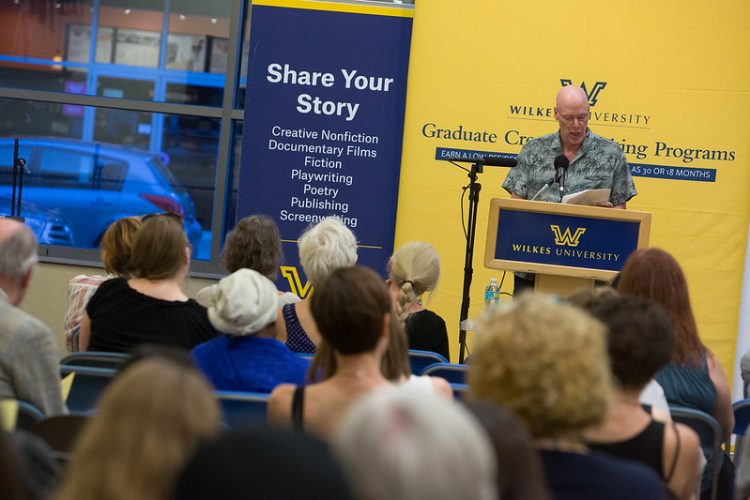Wilkes University’s Maslow Family Graduate Program in Creative Writing announces the launch of a new track in spoken word. It is the first graduate program in the United States leading to the Master of Arts or Master of Fine Arts degree in creative writing to offer a concentration in spoken word. Beginning in June 2021, students can choose to study spoken word in addition to the program’s established tracks in fiction, creative nonfiction, poetry, screenwriting, playwriting and publishing.
David Hicks, director of the Maslow creative writing program, says the new track extends the program’s focus while remaining true to its history of embracing all genres. “I see spoken word as a natural extension of the Wilkes mission to nurture a dialogue among genres and cultures,” Hicks says. “Spoken word will add a new dimension to our vibrant community. Our writers always have stepped beyond the parameters of rigidly defined genres. This is reflected in the diversity of our offerings, which include film, drama and publishing and an approach to fiction that embraces young adult (YA), romance, horror, and fantasy, as well as literary fiction and nonfiction.”
Students choosing the new track will begin their academic work by studying poetry in one of the program’s foundations courses before specializing in spoken word. Subsequent semesters will be spent studying the history of spoken word and the work of established spoken word artists. The creative thesis for spoken word students will include the development and performance of their own spoken word work. All students produce a creative thesis as the capstone to complete the requirements for the Master of Arts degree before continuing to complete the Master of Fine Arts degree requirements.
Members of the Maslow faculty teaching in the spoken word track will include accomplished poets Philip Brady and Remica Bingham-Risher. Brady is a poet, essayist and editor. He is the author of more than a half dozen books, most recently “The Elsewhere: New & Selected Poems”(Broadstone, 2020). Bingham-Risher is a Cave Canem fellow and Affrilachian Poet. She is the author of three award-winning poetry collections, most recently “Starlight & Error” (Diode, 2017), winner of the Diode Editions Book Award and a finalist for the Library of Virginia Book Award.
Brady notes that the oral presentation of poetry has been a graduation requirement for poets in the program since its inception. Noting that formal study of spoken word would extend that tradition, he adds, “Spoken word is a new initiative, but its roots go back to Homer, to a time before the alphabet, when poetry was meant to be heard, not seen, and lines were conceived and spoken in one breath.”
The impetus for beginning the spoken word program came from Wilkes alumni who came to the program to study other genres after accomplished careers as spoken word artists. They include:
Jeremiah Blue MFA ’19, who authored the formal proposal for the new spoken word track, won the 2016 Southwest Regional Championship and the 2015 Arizona Slam Poetry Championship.
Jason Carney MFA ’13, a poet, writer and educator from Dallas, and a four-time National Poetry Slam finalist also was honored as a Legend of the Slam in 2007. He appeared on three seasons of the HBO television series Russell Simmons Presents Def Poetry.
Laura E. J. Moran MFA ’12 is a poet, performer, playwright and educator from Sullivan County, N.Y. She has presented her work all over the United States and in Romania, Ireland, Italy, Canada and Mexico. In 2019, she was selected as one of 20 international arts educators to attend the Lincoln Center Arts Education Leadership Lab in New York City.
Alumni involvement with the spoken word track will include serving in an advisory capacity. Blue, Carney and Moran all have hosted Wilkes’ poetry slam events and open mic nights at the Association of Writers and Writing Programs (AWP) annual conferences.
About the Maslow Family Graduate Program in Creative Writing
The mission of the Maslow Family Graduate Program in Creative Writing is to educate students in the craft, life, and business practices of seven areas of study — fiction, poetry, screenwriting, playwriting, creative nonfiction, publishing and spoken word — through a commitment to excellent mentorships, publishing opportunities and industry-specific internships. Wilkes offers a nationally recognized and widely reputed graduate creative writing program where students and faculty find the writing support, community and market opportunities to become lifelong, productive, professional writers in all fields.
The Graduate Creative Writing program is offered in two formats. In the low-residency format, students learn online during the project semester and usually attend two eight-day in-person residencies each January and June. For the weekender program, students learn online and attend four online weekend class sessions each term.
About Wilkes University
Wilkes University is a private, independent, non-sectarian institution of higher education dedicated to academic and intellectual excellence through mentoring in the liberal arts, sciences and professional programs. Founded in 1933, Wilkes is on a mission to create one of the nation’s finest doctoral universities, offering all of the programs, activities and opportunities of a large university in the intimate, caring and mentoring environment of a small college, open to all who show promise. The Brookings Institution ranked Wilkes 14th in the nation for middle-class mobility. In addition to 45 majors, Wilkes offers 24 master’s degree programs and five doctoral/terminal degree programs, including the doctor of philosophy in nursing, doctor of nursing practice, doctor of education, doctor of pharmacy, and master of fine arts in creative writing. Learn more at www.wilkes.edu.
